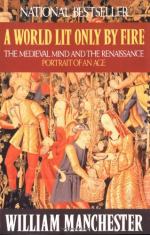|
This section contains 569 words (approx. 2 pages at 400 words per page) |

|
Chapter II, The Shattering (Sections 24-34) Summary and Analysis
Once the printing press was created, the reading public expanded. There were many cheap avenues of instruction. As free opinion broke out, the Papacy issued several futile bulls trying to restrict what people could read, but individuality had broken out and many great works survived. Even Catholic theologians became fluent in classical tongues and writers would write in the vernacular.
New universities sprouted up all over Europe. In this new system, genuine learning flourished and many men became autodidacts, self-taught readers. While many theology programs were corrupted by Scholastic and ecclesiological obsessions, others turned to actually learning ancient languages, like a more accurate form of Latin. The great success of the Renaissance, in Manchester's view, was to awaken Europe's ties to antiquity. The Renaissance man became a universal ideal for men...
(read more from the Chapter II, The Shattering (Sections 24-34) Summary)
|
This section contains 569 words (approx. 2 pages at 400 words per page) |

|




